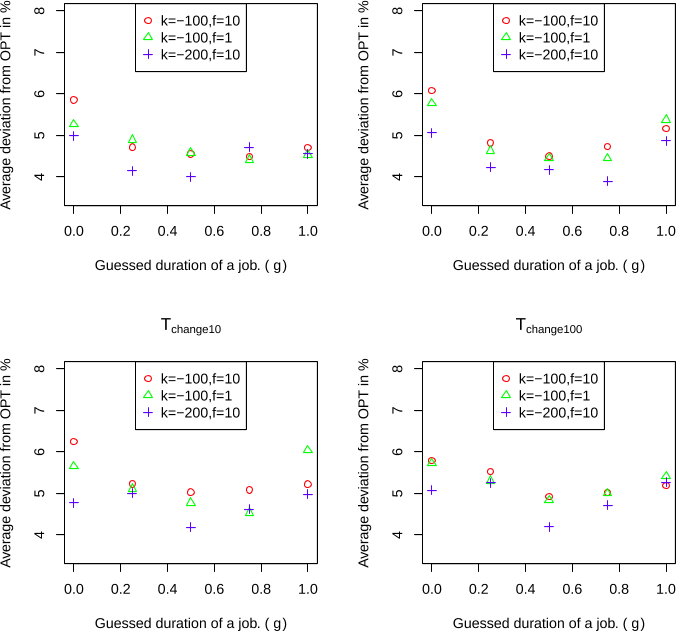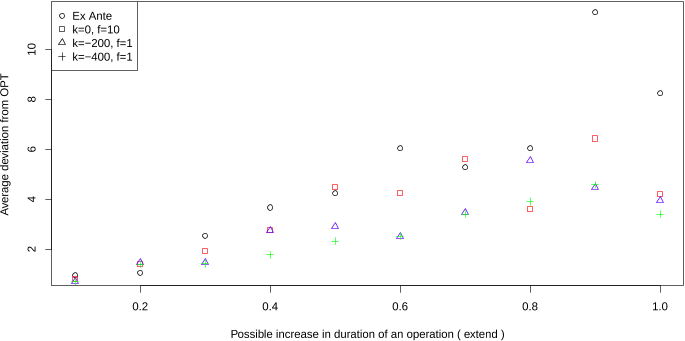
General rights
Copyright and moral rights for the publications made accessible in the public portal are retained by the authors and/or other copyright
owners and it is a condition of accessing publications that users recognise and abide by the legal requirements associated with these rights.
Users may download and print one copy of any publication from the public portal for the purpose of private study or research.
You may not further distribute the material or use it for any profit-making activity or commercial gain
You may freely distribute the URL identifying the publication in the public portal
If you believe that this document breaches copyright please contact us providing details, and we will remove access to the work immediately
and investigate your claim.
Downloaded from orbit.dtu.dk on: Aug 09, 2022
A framework for dynamic rescheduling problems
Larsen, Rune; Pranzo, Marco
Published in:
International Journal of Production Research
Link to article, DOI:
10.1080/00207543.2018.1456700
Publication date:
2019
Document Version
Peer reviewed version
Link back to DTU Orbit
Citation (APA):
Larsen, R., & Pranzo, M. (2019). A framework for dynamic rescheduling problems. International Journal of
Production Research, 57(1), 16-33. https://doi.org/10.1080/00207543.2018.1456700

UNIVERSIT
`
A DI SIENA
DIPARTIMENTO DI INGEGNERIA DELL’INFORMAZIONE
A Framework for
Dynamic Rescheduling Problems
Rune Larsen, Marco Pranzo
DII Technical Report n.2012-01
Research Group: Decision and Management Methods April 30, 2012

A Framework for
Dynamic Rescheduling Problems
Rune Larsen, Marco Pranzo
April 30, 2012
Abstract
Academic scheduling problems usually assume d eterministic and known
in advance data. However this situation is not often met in practice, since
data may be subject to uncertainty and it may change over time. In this
paper we introduce a general resched uling framework to address such dy-
namic scheduling problems. The framework consists in a solver and a con-
troller. The solver can also assume deterministic and static data, whereas
the controller is in charge of triggering the solver when needed and when
possible. Extensive tests are carried out for two well-known scheduling
problems, namely the single machine weighted completion time problem
and the job shop problem. The tests show how the proposed framework
allows to deal with d ifferent scheduling problems and to select the best
framework configuration.
Keywords: Scheduling, Simulation, Dyn amic rescheduling.
1 Introduction
Scheduling problems are among the hardest and the most studied problems in
operations research. However, as observed by many authors [10, 12], there is
still a gap between theory and practice, in fact most formulations of scheduling
problems usually assume that data is deterministic and static over time. It is
well known that both uncertainties and dynamic environments are often present
in real- world applications. Never theless these presences are often neglected since
they are hard to model and to take into account alg orithmically. Usually, sim-
plifying assumptions are done to assume all information deterministic, static
over time and known in advance. In some contexts these assumptions may be
reasonable since they lead to simplified and more tractable models. However,
a careful validation analysis on the problem is often required to assess whether
simplified models are reasonable or if they induce an oversimplification.
When the environment is assumed to be non- de terministic and dynamic
the pr oblem is to formulate a plan in which the pr esence of the uncertainties
has been taken into account during the solution process. At lea st two kind of
approaches have been proposed in the literature:
1. Approaches that try to produce the best possible plan incorporating a ll
the available information on the uncertainties. Among these approaches
we can mention stochastic programming [21] and robust optimization [4].
1

In stochastic programming the idea is trying to inc lude the uncertainty
sources directly in the formulation of the problem by generating and solv-
ing several sc enarios, if ne cessary allowing chang e s in the solution over
time. However, allowing recurse decisions makes the problem fundamen-
tally intractable. In robust optimization the idea is to try to produce
a “robust” solution satisfying additional constraints taking into account
possible rea liz ations of the uncertainty.
2. Approaches that try to r epresent the dynamic nature of the problem as
an additional layer between the solver and the application. In this case
the problem is usually maintained deterministic and the presence of the
uncertainty is addres sed in a external wrapper. As time passes, whenever
some conditions ar e met, the deterministic scheduling solver is invoked
and a new problem corresponding to a current “ snapshot” of the system
is solved. The results are then considered as a new plan to be followed
during the execution.
The advantages of dynamic rescheduling based approach over stochastic or
robust optimization are threefold:
Tractability A rescheduling approach a llows solving larger instances within
reasonable computation times allowing, if application permits, hundreds
of reschedules over time.
Easiness of implementation This approach does not require the develop-
ment of a new solver for the problem at hand, if the deterministic solver
can be adapted to meet some simple requirements. Hence, it can be put
in production faster.
Knowledge of the problem This approach is robust with respe c t to errors
in the uncertainty modelling, i.e., the effects of different probability distri-
butions and parameters, since there is no need to embed the uncertainty
in the solver.
However there are also shortfalls for these approaches. In fact, better perfor-
mances can be achieved if the solver takes the information on the uncertainties
into account within the optimization process. Moreover, no theoretical results
are known for this kind of approach.
In this paper we take a dynamic rescheduling approach, in which a deter-
ministic scheduling solver is dynamically executed to update the plan in order
to adapt uncertainties as they happen. The fo c us of this work is to introduce a
general framework to model a dynamic rescheduling problem in an unified way.
The main components of the system are:
Solver The solver is in charge of actually solving at each iteration the schedul-
ing problem and thus producing a plan that is going to b e executed.
Controller The Controller checks for rescheduling conditions during the execu-
tion of the schedule. Whenever a trigger condition is met, a new reschedul-
ing pro ble m is formulated according to the information available at the
moment and solved by the solver.
2

Simulator The simulator component loads all the information on the r eal-
world realiz ations of the probability functions when started, and it is re-
sponsible for simulating the unpredicted deviations and disturbances that
may happen in real-time. Note that the information is not sent to the
solver.
Our aim is to study when the uncertainty starts to be relevant in terms of
feasibility and optimality and how different re scheduling policies behaves. The
emphasis is given to the gene ral applicability of the method rather than to the
specific application or solver used. In fact, the answers to these questions may
be problem specific, however, it is important to have a single tool able to address
them.
The paper is organized as follows: In the next section we introduce definition
and notation. Section 3 briefly r e views the related literature and in Section 4
we introduce and describe the prop osed framework and all its str uc tural compo-
nents in detail. Section 5 shows the application of the framework to two different
scheduling problems. Finally conclusions and future research dir ections follow.
2 Definitions and notation
A scheduling problem can be clas sified as static if all the data is available at the
planning stage a nd no new info rmation is added to or modified in the problem
during the execution of the planned schedule. On the other hand, dynamic
scheduling refers to problems where data may change during the execution of
the scheduling and some information is not available to the scheduler at the
planning stage.
A problem is deterministic if all information is certain. In stochastic schedul-
ing problems, some da ta may be uncertain at planning stage. Different kinds
of information could be available to the scheduler such as the probability distri-
bution or expe c ted values. A stochastic ins tance has probability distributions
associated to each process time, and the deterministic instance resulting from
sampling these distributions will be called a sample instance.
When solving a scheduling problem, two phases can be dis tinguished namely,
a planning phase, in which the scheduler has to plan a schedule to solve the
instance at hand, and an execution phase, in which the plan is executed and,
depe nding on the application, it may be modified or not. Usually in scheduling
resear ch the main focus is on the planning phase [14].
A disruption/disturbance of the plan is an unforeseen event that affects the
plan typically during its exec ution. It may consist in the realization of an
uncertain event which was known in the form of probability distributio n, or it
may be a more disruptive event such as the breakdown o f a machine, failure
of oper ations, the arrival of some new and urgent job/order to be processed or
canceled jobs e tc. When a disruption occurs, and if the application setting makes
it possible, the scheduler has to decide whether to do nothing or reschedule. In
the former case the scheduler continues to follow the plan. While in the latter
case the scheduler should build/update the previous plan to reflect changes due
to the disruption.
Rescheduling is the act of modifying the offline plan in response to dis-
ruptions. Rescheduling is usually an expensive activity in terms of costs, time
3





